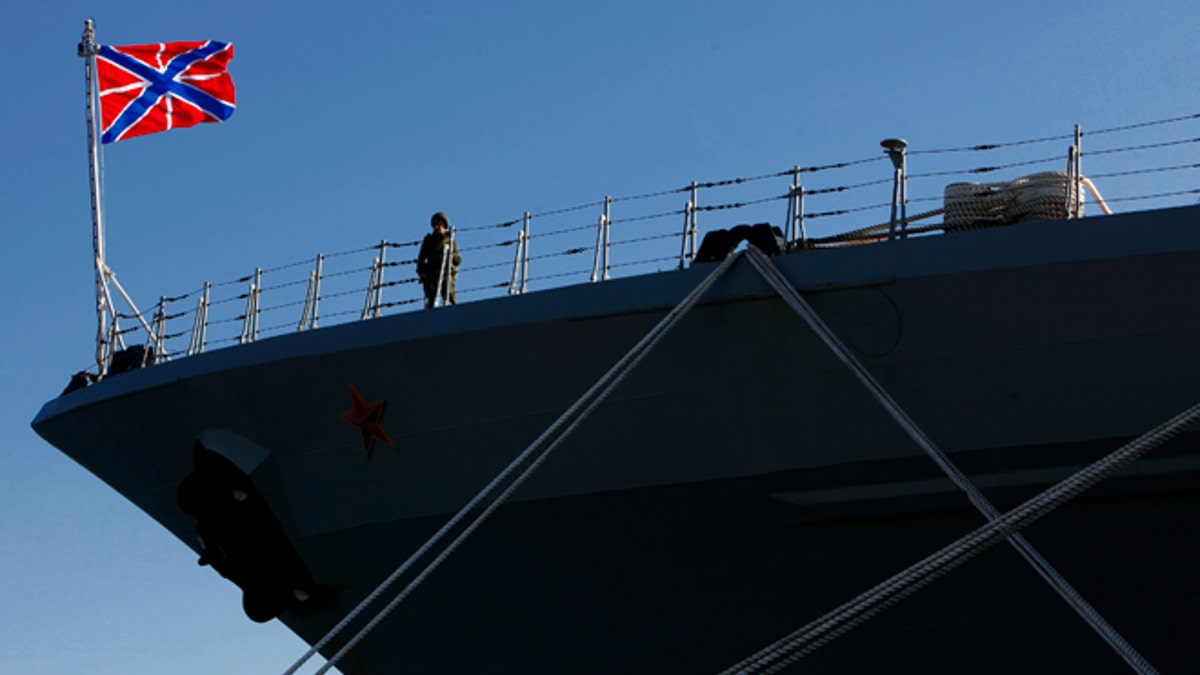
A Russian sailor stands guard on the Russian war ship "Peter the Great" in southern port city of Limassol, Cyprus, on Wednesday, Feb. 12, 2014. The Russian missile cruiser "Peter the Great" which is currently deployed in the region made a port of call at Cyprus' largest port. (AP Photo/Petros Karadjias) (AP2014)
At the same time that Russia was denying having blockaded Ukrainian naval facilities in Crimea, little-noticed reports came out of Moscow saying that Vladimir Putin’s government had ongoing conversations with eight foreign countries with the objective of building overseas military facilities, including in Cuba, Venezuela and Nicaragua.
“We need bases for refueling near the equator and in other places,” Russian Defense Minister, Sergei Shoigu, was quoted as saying by news agency ITAR-Tass.
According to another state-run news agency, RIA Novosti, Shoigu said: “The talks are underway, and we are close to signing the relevant documents.”
The Venezuelan Foreign Minister, Elías Jaua, responded that, "Because of the constitution, we cannot allow a foreign military installation in our country," according to the Caracas newspaper, El Universal.
Attempts to reach spokespeople at the U.S. State and Defense Departments went unanswered Monday due to weather concerns, but analysts were split about how ominously to take the report.
"If the Minister of Defense said it, I would absolutely take it seriously," John Reppert, a retired brigadier general in the U.S. Army who served as military attaché in Moscow for many years, said. "But the critical issue would be the nature and intent of the agreements. If it's essentially just refueling rights, it's probably benign and hard to generate much indignation over."
Reppert did add, "It would indicate that they are planning to expand their naval operations on this side of the Atlantic, which would be very much of interest."
The collapse of the Soviet Union in the early 1990s led to a decade of retrenchment in the Russian military. After 2002, when a naval facility in Vietnam and a radar station in Cuba were shuttered, the Russians retained only one military base in a country that hadn’t been part of the Soviet Union, and that’s a naval base in Tartus, Syria. An installation whose existence now is imperiled by the ongoing civil war in that country.
The U.S. maintains about two dozen military bases and "Forward Operating Locations" in Latin America and the Caribbean, stretching from Puerto Rico to Chile.
“I don’t see [Russia venturing militarily into Latin America] as really likely,” said Adam Isacson, defense and security specialist at the human rights organization Washington Office on Latin America. “It could be a goad to the U.S., or an attempt to show the world Russia is no longer a declining military power. Beyond the symbolic level, it may be an attempt to promote arms sales — Russia has been the top vendor of armaments in Latin America for the last couple of years thanks to huge sales to Venezuela.”
Nevertheless, Russia has been paying more military attention to Latin America in recent years. David Kerans, a correspondent for the U.S. edition of the Voice of Russia – that country’s Voice of America equivalent – told Fox News Latino that while he had no direct knowledge of any government outreach about bases, “It wouldn’t surprise me, and it would make a certain amount of sense strategically.”
Russian ships held joint maneuvers with the Venezuelan Navy in 2008 and have visited Cuban waters a few times since 2009, including last week, when the intelligence-gathering ship Viktor Leonov docked in Havana’s harbor without warning.
Tom O’Donnell, an expert on the international oil trade who teaches at New York University, said, "I have heard about talks, though I didn't know it had gotten so far."
O’Donnell thinks it unlikely that there is a master plan being unveiled. “It gives Putin great pleasure to put his finger in the U.S. eye every now and then,” he told Fox News Latino. But when O’Donnell has spoken to Russian government representatives about Putin’s strategy in Latin America, they have laughed.
“Strategy?” one told him. “He doesn’t have one.”
Indeed, O’Donnell ventured, “The Russian government's too burdened just trying to manage things inside Russia.”
